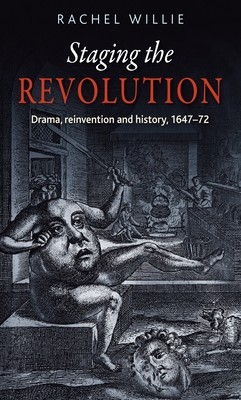
- We will send in 10–14 business days.
- Author: Rachel Willie
- Publisher: Manchester University Press
- Year: 2019
- Pages: 256
- ISBN-10: 1526139561
- ISBN-13: 9781526139566
- Format: 14 x 21.6 x 1.4 cm, softcover
- Language: English
- SAVE -10% with code: EXTRA
Reviews
Description
Staging the revolution offers a reassessment of drama that was produced during the commonwealth and the first decade of the Restoration. The book examines contemporary dramatic responses to the civil war period to show that, far from marking a new beginning, the Restoration is focused upon the previous thirty years. It complements recent studies that have addressed textual exchange and royalist and republican discourse.
Not all parliamentarians were opposed to the theatre and not all theatre was illegal under the commonwealth regimes. Equally, not all theatrical experience was royalist in focus. The often cited notion that 1660 marked the return to monarchical government and the rebirth of many cultural practices banned under an austere, Puritan, regime was a product of the 1650s and 1660s and it was fostered in some of the dramatic output of this period. The very presence of these dramas and their textual transmission challenges the notion that all holiday pastimes were forbidden. Staging the revolution builds upon these findings to examine ways in which drama negotiated the political moment. It explores the ways in which drama was appropriated as a means of responding to the civil wars and reinventing the recent past and also how drama was reinvented as a consequence of theatre closure.
Covering some of the work of John Dryden and William Davenant as well as lesser-known, anonymous and non-canonical writers, this book will be of interest to anyone researching mid-seventeenth century British history.
EXTRA 10 % discount with code: EXTRA
The promotion ends in 16d.02:35:38
The discount code is valid when purchasing from 10 €. Discounts do not stack.
- Author: Rachel Willie
- Publisher: Manchester University Press
- Year: 2019
- Pages: 256
- ISBN-10: 1526139561
- ISBN-13: 9781526139566
- Format: 14 x 21.6 x 1.4 cm, softcover
- Language: English English
Staging the revolution offers a reassessment of drama that was produced during the commonwealth and the first decade of the Restoration. The book examines contemporary dramatic responses to the civil war period to show that, far from marking a new beginning, the Restoration is focused upon the previous thirty years. It complements recent studies that have addressed textual exchange and royalist and republican discourse.
Not all parliamentarians were opposed to the theatre and not all theatre was illegal under the commonwealth regimes. Equally, not all theatrical experience was royalist in focus. The often cited notion that 1660 marked the return to monarchical government and the rebirth of many cultural practices banned under an austere, Puritan, regime was a product of the 1650s and 1660s and it was fostered in some of the dramatic output of this period. The very presence of these dramas and their textual transmission challenges the notion that all holiday pastimes were forbidden. Staging the revolution builds upon these findings to examine ways in which drama negotiated the political moment. It explores the ways in which drama was appropriated as a means of responding to the civil wars and reinventing the recent past and also how drama was reinvented as a consequence of theatre closure.
Covering some of the work of John Dryden and William Davenant as well as lesser-known, anonymous and non-canonical writers, this book will be of interest to anyone researching mid-seventeenth century British history.


Reviews